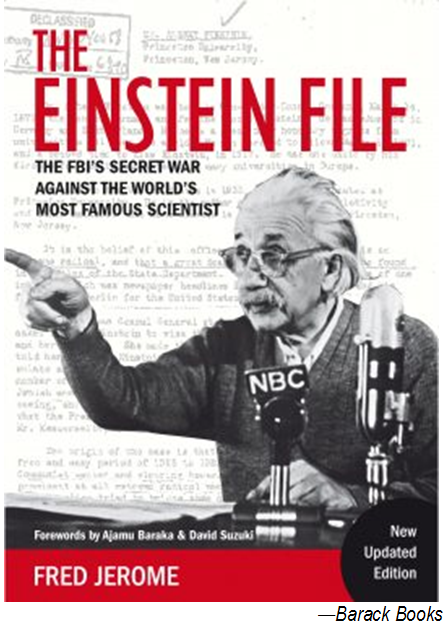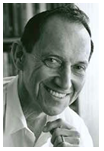
Past as Prologue? HOT OFF the press: Updated edition of “The Einstein File,” a tale of yesterday’s hate and fear—echoed in the age of Trump.
Déjà Vu
Thugs, Lies & Fevered Fantasies
‘The corpse of McCarthy-Hooverism still stirs’
by Thomas Adcock
Copyright © 2018 – Thomas Adcock
NEW YORK CITY, near America
Not so long ago, a paunchy prevaricator in Washington proposed to “make America great again,” as the slogan goes. It was the flag-waving, Jesus-jumping Cold War era of anti-communist hysteria in the United States: the perfect zeitgeist for J. Edgar Hoover to exert his racist, anti-Semitic, anti- intellectual, anti-science, anti-immigrant, authoritarian proclivities. In his official capacity as director of the Federal Bureau of Investigation, Mr. Hoover relentlessly persecuted Albert Einstein, the German-born émigré, genius, socialist, and naturalized American citizen of the Jewish persuasion whose lifetime of honors include the Nobel Prize, the Copley Medal of Britain’s Royal Society, the Max Planck Medal of the German Physical Society, his likeness affixed to the eight-cent U.S. stamp in 1966, a brass statue of himself unveiled in the nation’s capital in 1979, and Time magazine’s designated “Person of the Century” in 1999.
intellectual, anti-science, anti-immigrant, authoritarian proclivities. In his official capacity as director of the Federal Bureau of Investigation, Mr. Hoover relentlessly persecuted Albert Einstein, the German-born émigré, genius, socialist, and naturalized American citizen of the Jewish persuasion whose lifetime of honors include the Nobel Prize, the Copley Medal of Britain’s Royal Society, the Max Planck Medal of the German Physical Society, his likeness affixed to the eight-cent U.S. stamp in 1966, a brass statue of himself unveiled in the nation’s capital in 1979, and Time magazine’s designated “Person of the Century” in 1999.
Now comes Donald J. Trump, a “modern-day Hoover” as the distinguished New York journalist and author Fred Jerome references the pudgy,  bigoted, lying ignoramus and seat moistener defiling the White House; that is, until he resigns in disgrace or is otherwise ousted, or imprisoned. At this writing, meanwhile, Mr. Trump is free to be the shame of America. As such, he travels the land yammering his “Make America Great Again” catchphrase, a creepy echo of Adolf Hitler’s campaign promise in Germany’s 1932 federal election: “Ich werde Deutschland zu wahrer Größe führen.” Meaning, in English, “I will make Germany great again.”
bigoted, lying ignoramus and seat moistener defiling the White House; that is, until he resigns in disgrace or is otherwise ousted, or imprisoned. At this writing, meanwhile, Mr. Trump is free to be the shame of America. As such, he travels the land yammering his “Make America Great Again” catchphrase, a creepy echo of Adolf Hitler’s campaign promise in Germany’s 1932 federal election: “Ich werde Deutschland zu wahrer Größe führen.” Meaning, in English, “I will make Germany great again.”
Similarly creepy, Herr Trump’s authoritarian pledge during America’s 2016 presidential election: “I alone can fix it; I will restore law and order.”
Déjà vu?
Yes, one could say. But with an asterisk for irony.
If one takes seriously the right-wing squawks and splenetic Twitter rants of Donald Trump, it seems the F.B.I. boys of today are persecuting him and his attorney—fellow-traveling gonif Michael Cohen.
 Latest case in point: Early on the of April ninth, Mr. Cohen’s home and office in New York were raided by F.B.I. agents per a court-issued warrant seeking financial records related to more than a quarter million dollars in hush money Mr. Cohen dispensed to two of Mr. Trump’s paramours—pornographic film actress Stormy Daniels (pictured at top right); and Karen McDougal, former nude cover girl for the lad magazine Playboy. The ladies in question had flings with the 71-year-old shame of America a few months after Mr. Trump’s immigrant wife from Slovenia, née Melanija Knavs, gave birth to their now 12-year-old son Barron. Mama Trump, herself a former nude model (bottom right), will turn 48 years of age on April twenty-sixth. Surely Papa Trump will see to a gala birthday bash for his cuckquean.
Latest case in point: Early on the of April ninth, Mr. Cohen’s home and office in New York were raided by F.B.I. agents per a court-issued warrant seeking financial records related to more than a quarter million dollars in hush money Mr. Cohen dispensed to two of Mr. Trump’s paramours—pornographic film actress Stormy Daniels (pictured at top right); and Karen McDougal, former nude cover girl for the lad magazine Playboy. The ladies in question had flings with the 71-year-old shame of America a few months after Mr. Trump’s immigrant wife from Slovenia, née Melanija Knavs, gave birth to their now 12-year-old son Barron. Mama Trump, herself a former nude model (bottom right), will turn 48 years of age on April twenty-sixth. Surely Papa Trump will see to a gala birthday bash for his cuckquean.
It is delicious to consider an additional irony: A nudie and a porn star, each something more than tangential to criminal investigations underway against the president, may ultimately topple the Trump administration in Washington—just as two naughty young women back in the 1960s, the topless dancers Christine Keeler and Mandy Rice-Davies, were central figures, so to speak, in the collapse of the late Prime Minister Harold Macmillan’s government in London.
Let us here postpone the subject of Mr. Trump for later comment herein, and return to the matter of J. Edgar Hoover and the world’s most famous scientist.
Of great offense to Mr. Hoover (1875-1972)—a.k.a. “Mary” in his private moments of transvestism—was Albert Einstein’s lefty Weltanschauung.
A beloved panjandrum at Princeton University in the state of New Jersey, Professor Einstein (1879-1955) burst onto the world stage in 1915 with publication of his Theory of General Relativity, represented in the renowned mathematical formula E=mc2. From the time he arrived in America, as an exile from Adolf Hitler’s Germany, and forward to the day he died, Professor Einstein was admired as well by the general public. Not only for his scientific achievements and (for some) his political involvements, but also for his humility and wit—the latter two qualities clearly lacking in his nemesis, J. Edgar Hoover, and certainly in the aforementioned contemporary version.
 In his 2002 book “The Einstein File: J. Edgar Hoover’s Secret War Against the World’s Most Famous Scientist,” author Fred Jerome cited an early example of his subject’s wit. Soon after leaving the Third Reich behind, Professor Einstein’s host at the California Institute of Technology informed him that pro-Nazi newspapers back in Europe had “put a price on his head equivalent to $50,000 (€40,500),” Mr. Jerome wrote. “On hearing the news, Einstein quipped, ‘I didn’t know I was worth so much.’”
In his 2002 book “The Einstein File: J. Edgar Hoover’s Secret War Against the World’s Most Famous Scientist,” author Fred Jerome cited an early example of his subject’s wit. Soon after leaving the Third Reich behind, Professor Einstein’s host at the California Institute of Technology informed him that pro-Nazi newspapers back in Europe had “put a price on his head equivalent to $50,000 (€40,500),” Mr. Jerome wrote. “On hearing the news, Einstein quipped, ‘I didn’t know I was worth so much.’”
Well aware of its imprimatur value, Professor Einstein lent his name to numerous progressive political causes, both domestic and international. This further provoked the irritable Mr. Hoover, who assigned a covert squad of F.B.I. goons to ferret out documented proof that Einstein-blessed organizations were “subversive” and/or “communist front” groups. Some one thousand and eight hundred pages later, a dossier was born—“evidenced” by newspaper articles, affiliation lists, and crackbrain accusations from the likes of the Woman Patriot Corporation, headed by the delightfully named Mrs. Randolph Frothington.
Surprisingly, the contained not a single article of advocacy published by the prolific and highly opinionated professor, nor any use of the word “science” in regards to the world’s most famous scientist.
In the updated “Einstein File,” published this spring by Baraka Books of Montréal, Mr. Jerome reasons that the F.B.I. might have saved a fortune in creating its utterly non-incriminating dossier by engaging a clip service rather than sending inept gumshoes on the federal payroll to sip tea with Mrs. Frothington and her circle of conspiracists.
For those who must, the F.B.I. dossier may be read, in its nearly two thousand-page entirety, at www.theeinsteinfile.com.

Albert Einstein endorsed dozens of high-minded organizations in the 1930s, including the German-American League for Culture, the Hollywood Anti-Nazi League, the American Committee for the Protection of the Foreign-Born, the Committee for Peace Through World Coöperation, the National Federation for Constitutional Liberties, and the Independent Citizens Committee of the Arts, Sciences and Professions.
But over time, the pride of Princeton became—horror of horrors!—a stalwart in the cause of social justice for non-Caucasians. In 1937, the professor opened his home near the university campus to African American contralto Marian Anderson (1897-1993). Despite praise from colleagues of Ms. Anderson’s time—“Your voice is heard once in a hundred years,” said Italian conductor Arturo Toscanini—Princeton’s whites-only Nassau Inn refused to accommodate her when she arrived in the city to perform. Perhaps worst of all, by Mr. Hoover’s dark lights, Professor Einstein was a close personal friend of Paul Leroy Robeson (1898-1976), the bass-baritone concert performer, film actor, athlete, Columbia Law School alumnus, and African American civil rights activist. Mr. Robeson was blacklisted as a “Red” from 1950-55, the pinnacle years of Senator Joseph McCarthy’s anti-communist racket—the eponymous “McCarthy Era” of overlapping hate and fear.
A pal of Robeson’s? Ipso facto, Einstein was likewise a commie, and a treasonous spy to boot. So went the groupthink at Mr. Hoover’s F.B.I.
Though their styles differed, Senator McCarthy and F.B.I. Director Hoover found the fevered fantasy of communist menace to be a convenient camouflage for uglier purposes, e.g. union busting, Jew-baiting, and turning a blind eye to a post-World War II epidemic of lynching black veterans—“uppity niggers,” as the saying had it, virtually all the vets being innocent men murdered by race-crazed mobs.
Senator McCarthy died, as a hopeless drunkard, in 1957. His chief legal counsel, the sleazy New York lawyer Roy Cohn, died of AIDS in 1986; during the first half of that decadent decade, Mr. Cohn was Donald Trump’s consigliere, succeeded by the comparably named and recently raided Mr. Cohen.
In September of 1946, Professor Einstein happily agreed to Mr. Robeson’s proposal that the two of them spearhead a new multi-racial civil rights organization—the American Crusade to End Lynching. The white professor was now formally in step with his black friend in civil rights activism. Mr. Hoover, of course, was immediately suspicious.
Author Fred Jerome writes of the period:
Race had not been a central consideration when Einstein moved to Princeton…He was seeking a quiet workspace, a violin-playing, pipe-smoking space, and a refuge from media attention. ‘Into this small university town,’ Einstein wrote…’the chaotic voices of human strife barely penetrate. I am almost ashamed to be living in such peace while all the rest struggle and suffer.’
 Not that he had been oblivious to racism in America. …[O]n arriving in Princeton, his most striking impression had to be the contrast with Berlin—the absence of SS agents and young boys with swastika armbands roaming the streets.
Not that he had been oblivious to racism in America. …[O]n arriving in Princeton, his most striking impression had to be the contrast with Berlin—the absence of SS agents and young boys with swastika armbands roaming the streets.
But anyone living in Princeton in the 1930s and ‘40s could not miss the racism. …On the campus, as at all the Ivy League schools, the university’s quota system allowed for only a few Jewish students. …And if you were black, whether student or faculty, the university was totally off-limits. …As late as September 1942, while United States and Allied troops were battling fascism overseas, the Princeton Herald ‘explained’ that admitting black students to the university, while morally justified, would simply be too offensive to the large number of Princeton’s southern students.
The town itself was as racially divided as its movie theater, where whites and blacks sat in separate sections until well after World War II had defeated Hitlerism. …Robeson, who was born in Princeton, called it a ‘Georgia plantation town.’
The F.B.I.’s official report on the Einstein-Robeson project was predictably hostile: “[T]his Crusade has all the earmarks of another Communist attempt to instill racial agitation.” Elaborating on an assessment worthy of Mrs. Frothington, Mr. Jerome writes: “The government’s anti-communism policy…relied on the argument that the communists were threatening to take over the world, and a crackdown—with the F.B.I. as watchdog and pointer—was necessary to stop them. The only thing that mattered in the Bureau’s evaluation of a suspect organization—or of a suspect individual like Einstein—was whether they collaborated with ‘Reds’ like Robeson.”
Perhaps the Hooverian attitude influenced President Harry Truman when he received a Crusade delegation at the White House, led by Mr. Robeson. (Absent was an ailing Professor Einstein, who nevertheless submitted a letter that Mr. Truman probably never read.) An account of the meeting was published in the black-owned Chicago Defender newspaper:
In terms which left no doubt in the minds of the delegation…President Truman today emphatically refused to take the initiative to end mob violence and the spread of terrorism in America…[declaring] the whole question of lynching and mob violence was one to be dealt with in political terms and strategy…and patience must attend the final solution.
Robeson…said returning [black] veterans are showing signs of restiveness and indicated that they are determined to get the justice here they have fought for abroad. Robeson warned that this restiveness might produce an emergency situation [that] would require Federal intervention. The President, shaking his fist, stated this sounded like a threat.
Bottom line: Nothing was done or ever has been done, legislatively or by presidential directive, to satisfy the Crusade’s moral quest, or that of succeeding organizations such as today’s Black Lives Matter. Nothing beyond the pale ceremony of U.S. Senate Resolution 39 in June of 2005 apologizing for the federal government’s many failures to adopt anti-lynching statutes; the resolution, thirteen years ago, marked the first time the government formally apologized for oppression of the nation’s black citizens.
I suppose nothing can be done about the evil of anti-Semitism, embraced by J. Edgar Hoover. Among his favorite Miami Beach resort hotels back in the day was one that sported a lobby sign to “gladden the heart of Lucifer,” as my grandfather Ben would say, shaking his great gray head in disgust: NO DOGS, NO JEWS.
*
“We would like to believe that such a fearful age [as in Mr. Hoover’s time] will never happen again,” Mr. Jerome wrote in concluding the first iteration of his book. But lately, he noted, “a small group of conservative historians has been raising signals that it wasn’t really such a bad time and, in fact, did America a lot of good with its political cleansing…More serious signs that the corpse of McCarthy-Hooverism still stirs have also begun to appear.”
Those lines were written in 2002, long before anyone imagined a dangerous yellow-haired buffoon as president of the United States. Before we imagined the disturbing appeal of branding Mexican immigrants as rapists, or coast-to-coast murders of black men by white cops, or refusing entry to America by Muslim refugees who appreciate the Statue of Liberty’s promise so urgently, or a president who would label American journalists “enemies of the people.”
Or Nazi thugs and Ku Klux Klansmen marching proudly through the streets with guns and venomous taunts as the man in the White House describes “some” of their ilk as “very fine people.”
As I write, daily headlines persuade me that pressure on Donald Trump from ongoing investigations of journalistic and prosecutorial nature will vex him to the point of launching sure-to-fail war on Syria, a country headed by a dictator who slaughters his own people with nerve gas and barrel bombs. And since Russia maintains the largest military presence in Syria, its most important ally in the Middle East, it is not unreasonable to fear for a stumble into nuclear war.
How convenient a diversion! A diversion from news of Mr. Trump’s likely crimes of finance and sex, soon to be among the trove of damning papers and computer data once in Michael Cohen’s greasy possession. That, and evidence of Mr. Trump’s probable culpability in Russia’s cyber-attack on American democracy during the presidential election of 2016.
As an intriguing incidence of psychological projection, Mr. Jerome told me in an interview, “Donald Trump says ‘treason’ more than any other president in history.”
The author named the most important point of his book: Dismay was never despair for Albert Einstein. Of such a spirit, Mr. Jerome wrote:
Certainly—if he were here now—today’s Trumped-up world would not be the first disappointment for Einstein. Throughout the first half of the 20th Century, he was often disappointed…[T]he worldwide rise of racism, anti-Semitism and anti-immigrant-ism were clearly disappointments to him, but perhaps nothing was more tragic in his eyes than the U.S. [nuclear] bombing of Japan.
Yet even after this most tragic event, Einstein did not despair. His answer was to organize…With other similarly dismayed nuclear scientists, Einstein helped to organize…and served as chairman of the Emergency Committee of Atomic Scientists…to educate the public on the dangers of nuclear weapons, and to organize a campaign against nuclear war.
At the end of his years, in conversation with a friend, Professor Einstein summed up what he may have felt to be the most important point of his life: “Though everybody knows me, there are very few people who really know me. I am a revolutionary. I am an organizer.”
—Thomas Adcock is America correspondent for CulturMag,
and, according to Donald Trump, an “enemy of the people”
Additional photo credits
J. Edgar Hoover – zerohedge.com
Donald Trump – marieclaire.co.uk
Stormy Daniels – marieclaire.co.uk
Karen McDougal – ebay.com
Melania Trump – GQ.com
Albert Einstein – thoughtco.com
Paul Robeson – biography.com
Joseph McCarthy & Roy Cohn – pinterest.com
Marian Anderson – pinterest.com
Fred Jerome – jerome@theeinsteinfile.com











